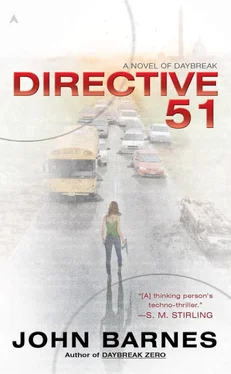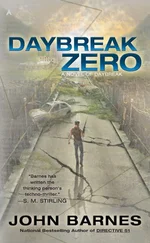“Meanwhile, McIntyre just wants his old job back so he can be put in charge of knocking out the launch site, assuming we ever manage to find it. And Graham keeps scribbling on his damned pad and muttering ‘Hmmm,’ and he’s just not speaking up and asserting himself, which is what he needs to do!” Allison Sok Banh was normally one of those reserved women who must endure the ice-princess label, but that didn’t seem to be her problem today. “Anyway,” she said, calming a little, “they told me to brief you, so I decided I’d just save time and tell you the truth.”
“Shit. You want to be careful with that stuff, people get hurt playing with it. Before we go into any more detail, I’ve got two people who walked six days to get here, with access to a resource that might help save the whole country across the next century, and it sounds like I won’t be able to set them up with anyone to talk to.”
“Well,” Allie said, “there’s me. How about I go out there, make all sorts of nice apologies for everyone, turn on the charm, and generally win them over to the cause?”
“Well, you can certainly do it—I’ve seen you—”
“I’m pretty sure I can speak for Graham and make it sound convincing. And if they need a presidential decision on something, I’ll sweet-talk Graham to go along with whatever deal I need to cut or arrangement I need to make. He listens to me a lot these days.” Something about Allie’s smile bothered Heather, and she hoped she didn’t know what it was. “Better fill me in on what your two new friends do and why you think it’s vital; we want them to feel valued, and nothing creates the impression of neglect like being asked the same questions over and over.”
THE NEXT DAY. EAST OF GRAND JUNCTION. COLORADO. 1:45 P.M. MST. TUESDAY. DECEMBER 24.
Heather and Allie sat at a newly-bolted-in picnic table in the observation car that was attached ahead of Amtrak One, as the presidential car was being called, much to Graham’s annoyance. Spectacular scenery rolled by; they had time to review Allie’s notes about what was available at Pueblo.
“I can’t believe how many obsolete-tech people came out of the woodwork,” Heather said, after a while. “Steam railroad buffs. Hobby printers. Guys who build their own tubes for tube amps. Steam car collectors, and that guy with all those nineteenth-century machine guns, and of course guys like Quattro with his old airplanes. I suppose it’s not that shocking that there’s a whole nest of them with printing presses and warehouses full of pamphlets down in Pueblo.”
Allie shrugged. “People spent their working lives learning a technology, and that’s a pretty deep commitment. That nice lady in Pale Bluff was a Gregg shorthand expert, probably one of the youngest and last I would guess.”
“Steam trains, though? Too far in the past; no one nowadays grew up around them.”
“Oh, well, as far as I can tell, steam trains are a religion . We think that the United States might have as many as two hundred working steam locomotives, eighty-four of them narrow-gauge. Anyway, the bottom line is this: If James and Leslie are giving me an accurate picture, in their warehouses, they have all, or almost all, the information we need to get people at least back to a 1940s or 1950s level of comfort—much of it on reserve printing plates, which means with some materials and training, enough to paper the country with it. GPO is a huge repository of how to do everything, and we just need to get a train running down to them, find them the paper and ink and maybe some spare parts, and feed them regularly.”
Heather smiled, thinking how happy Leslie and James must have been after their meeting with Allie. “So I did good putting them in touch with you? This is about as excited as I’ve seen you get about anything since Daybreak.”
“You did brilliantly. And of course I’m jacked about this, Heather, if I’d been smart enough I’d’ve been praying for Pueblo or something like it to turn up—they have so much potential for knitting the country together. Back when distances were bigger and travel wasn’t common, that used to be one of the things that reminded people they were Americans, not just Nebraskans or whatever—that little pamphlet from the Federal government about how to keep milk from spoiling, or how to build a tower for your windmill. Hah, now there’s a view!”
The land fell away to the south and west as they descended the long curve, and below them a deep lake, surrounded by redrock, reflected the sky back. “I’ve driven through here but never seen what it looked like—my eyes were always on the road ahead, too much to worry about,” Heather said. “Speaking of which… you think we’ll find a way to bring Cam and Graham back together?”
“I think Graham still hopes so, but as for me—”
“We’re coming up on Glenwood Springs,” Sherry said, sticking her head up from the stairway below. “Nobody’s told me if that’s Colorado or Utah.”
“Colorado,” Heather said. “Two more stops before Utah. I should splash some water on my face; it’s my turn to be standing near Graham, looking attentive and visibly holding a gun.”
As Heather heard the speech for the fourth time and ostentatiously looked over the crowd, hoping to seem intimidating, Allie was standing pretty close to Graham Weisbrod and shining Nancy-Reagan-style adoration at him.
Crap. Innocent or not, this is gonna weird out Arnie, and I need him not crazy. And I don’t really think it’s innocent.
Furthermore… Graham had been a media darling for a long time and knew how to work a crowd. But had he always enjoyed it quite this much? Maybe we need a politician for this job, but I’m not sure I wanted the politician to be Graham. This is the guy who used to tell me that I knew better; I wonder, nowadays, if he does?
THE NEXT DAY. ATHENS. TNG DISTRICT. (ATHENS. GEORGIA.) 10:30 A.M. EST. WEDNESDAY. DECEMBER 25.
It wasn’t the worst prison in the world; they fed him the same as they did the guards, and he was allowed notebooks and paper, and the time to sit and write.
When the summons came, the guard said, “While you’re meeting with the NCCC, we’re supposed to pack all your things. He said to ask you if the notebooks go in a special order, and if you’d rather have them any particular place in this.”
The man held up a canvas/steel rucksack that was probably an antique, since there was no whiff of rotting plastic or nylon about it.
“If this one goes in this outside pocket,” Chris said, “with a few pens, so I can whip it out and write fast, that would be great. The older ones over there on the bench should all go in on top of my spare boots and clothes, so they won’t get damp from just setting the pack down, but not too close to the top in case rain leaks in.”
“Kind of bury them in the middle? Got it. He also wanted us to see if you wanted one or two more spare blank notebooks to take with you, but he thought you’d be able to forage for them on your way, too.”
“Maybe one spare would be nice, so I don’t have to forage too soon. Where am I going?”
“Beats me, Mr. Manckiewicz, I’m supposed to take you to the Natcon, and get your pack ready while you’re in with him. Maybe he’ll tell you.”
Cameron Nguyen-Peters was thinner than ever, and whatever traces of a smile had ever been around his mouth had vanished. He still had his pliers-like handshake and disconcerting way of looking directly at you. “Chris,” he said, “you are a problem, and there are only three things that can be done with a problem—ignore it, solve it, or make it someone else’s problem. Have a seat, and we’ll discuss the situation and the options.”
Читать дальше












